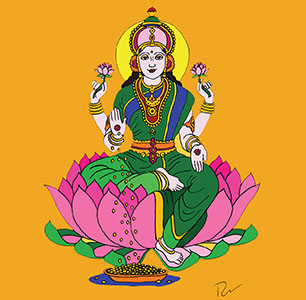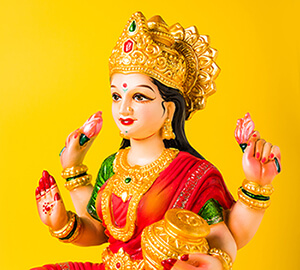
Lakshmi Mantra: Meaning, Stories & Symbolism
Blessings from the Hindu Goddess of Wealth
Lakshmi is the Hindu goddess of wealth and fortune. She is the personification of all that is good, helpful, and beneficial. Lakshmi mantras bring auspiciousness and prosperity. She is also known as Laxmi. In either case, her name is derived from a Sanskrit word meaning goal, aim or sign. Another name for Lakshmi is Lola. Lola means “one who is moving or flowing.”
Watch nearly 400 videos on the Vocal Medicine Channel!
The words to this Sanskrit chant to Lakshmi are “Om Hrim Shrim Lakshmi Bhayo Namaha” meaning “Honor to Lakshmi who gives us blessings.”
Jealousy of the Gods
In one story about Lakshmi’s origin, she is said to have been born from Prahjpati, the Lord of all creatures. Unfortunately, the gods recognized her important position and became covetous of her. They demanded that she be killed so that they could take her powers. Prajpati refused, saying that they must seek her gifts without violence.
Symbols of Lakshmi
The goddess Lakshmi is associated with gold coins as well as rice and basil. She dispenses gold coins from one of her other four hands. Sometimes Lakshmi dispenses rice from her other hand, symbolizing an abundance of food. The rice lands in a bowl of gold coins set just in front of her.
Lakshmi and the Lotus Flower
In addition, Lakshmi is usually shown seated or standing on a lotus. The lotus symbolizes creation, beauty, harmony, diversity, stability, and support. Lakshmi (or Laxmi) appears in Hinduism, Jainism, and Buddhism.
Six Gifts of Lakshmi
Lakshmi is endowed with six auspicious or divine qualities known as gunas. These gifts include imperial authority, martial energy, priestly authority, dominion, splendor, and nourishment. In the ancient scripture known as the Shapati Brahmana, Lakshmi is described as beautiful and resplendent with immense powers and energy.
A Cosmic Story About Lakshmi
One day Indra, the god of heaven and the sky, was riding through the celestial realms on his white elephant. An old sage named Durvasas was standing on the side of the road. Durvasas was an ascetic with matted hair and a body covered with dust. He offers a garland to Indra. He tells Indra that the garland contains the essence of auspiciousness and prosperity.
Dishonoring the Symbolic Garland
Indra takes the garland and rides on. Before he is out of sight, he drops the garland about the neck of his elephant. This is huge insult. Out of respect, he should have placed the garland around his own neck. Durvasas declares, “Just as you have dishonored auspiciousness, auspiciousness will abandon you.”
Desolation of the Earth
In that moment, every flower in the kingdom wilted, every tree drooped, lovers began to quarrel, parents neglected their children, neighbors began to feud, rulers ignored the needs of their people, and a dull cloud lay over the land. The garland was actually the embodiment of Lakshmi, the goddess of wealth. She had now withdrawn from heaven and earth.
Watch nearly 400 videos on the Vocal Medicine Channel!
Lakshmi Withdraws Into the Ocean
The gods appeal to Vishnu, Lakshmi’s consort, to try and bring her back into the world. Vishnu knows his wife’s temperament. He knows that her response to an insult is to enfold herself back into the sea of consciousness. He goes into deep meditation to find her and a solution to the dilemma. He discovers that the sea must be churned to bring her back.
Assembly of the Gods and Demons
Vishnu assembles the gods (devas) on one side of the ocean and the demons (asuras) on the other. He calls forth a great serpent to be a rope around the cosmic churning stick. The tortoise Kurma dives to the bottom of the ocean to support the churning stick from underneath.
Lakshmi Returns to the Earth
The gods and demons churn the ocean to reveal many amazing gifts but Lakshmi does not appear. They churn the ocean for a long, long time. Finally the most glorious goddess imaginable appears. All are vying for her attention and love. Lakshmi reaches out her hand to Vishnu, her eternal consort. Lakshmi has returned!
The Earth is Restored
Suddenly the earth bursts into flower again, the trees stand upright, the lovers start admiring each other again, parents and children are reunited, the fields grow crops once more, rulers begin to rule wisely and compassionately again, and the sun shines brightly in the sky. Without the power of divine grace, all was lost. Now that auspiciousness has reappeared, all is prosperity and joy.

Lakshmi and the Festival of Lights
Diwali is the Hindu festival of lights, which is celebrated every autumn in the northern hemisphere (spring in the southern hemisphere). Diwali symbolizes the spiritual victory of light over darkness, good over evil, and knowledge over ignorance. During this celebrations, temples, homes, shops, and office buildings are brightly illuminated. The preparations and rituals for the festival typically last five days.
Lakshmi and the Celebration of Diwali
Leading up to Diwali, celebrants will prepare by cleaning, renovating, and decorating their homes and workplaces. At the peak of the festival, revelers adorn themselves in their finest clothes and give offerings to the goddess Lakshmi, the Hindu goddess of prosperity and wealth. In addition to illuminating their homes with oil lamps and candles, participants light fireworks, partake in feasts and share sweets and gifts.
Diwali as an Official Holiday
The names of the festive days of Diwali and the associated rituals vary from region to region. Adherents to religions other than Hinduism also celebrate Diwali. This includes the Jains, Sikhs, and some Buddhists. Diwali is an official holiday in Fiji, Guyana, India, Malaysia, Mauritius, Myanmar, Nepal, Singapore, Sri Lanka, Suriname, Trinidad, and Tobago.
Lakshmi Mantra Article Summary
Lakshmi, the goddess of wealth, is the personification of all that is good, helpful and beneficial. Lakshmi is the consort of Vishnu, one of the three deities in the Hindu trinity. This article includes a Lakshmi mantra and explains the symbolic meaning of this Hindu goddess.
Click for all content on our Site Map
Author Kathleen Karlsen
Kathleen Karlsen is a musician, artist, writer and speaker. She is the author of two books (Flower Symbols and Vocal Medicine) and over 200 articles. Kathleen, her husband Andrew, and their five children live in Bozeman, Montana. More about Kathleen Karlsen.
Share this page with a friend!
![]() Vocal Medicine Music on Spotify!
Vocal Medicine Music on Spotify!






